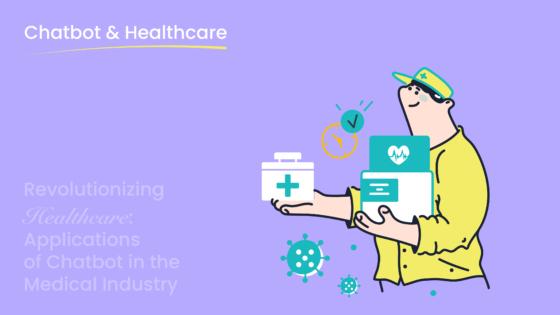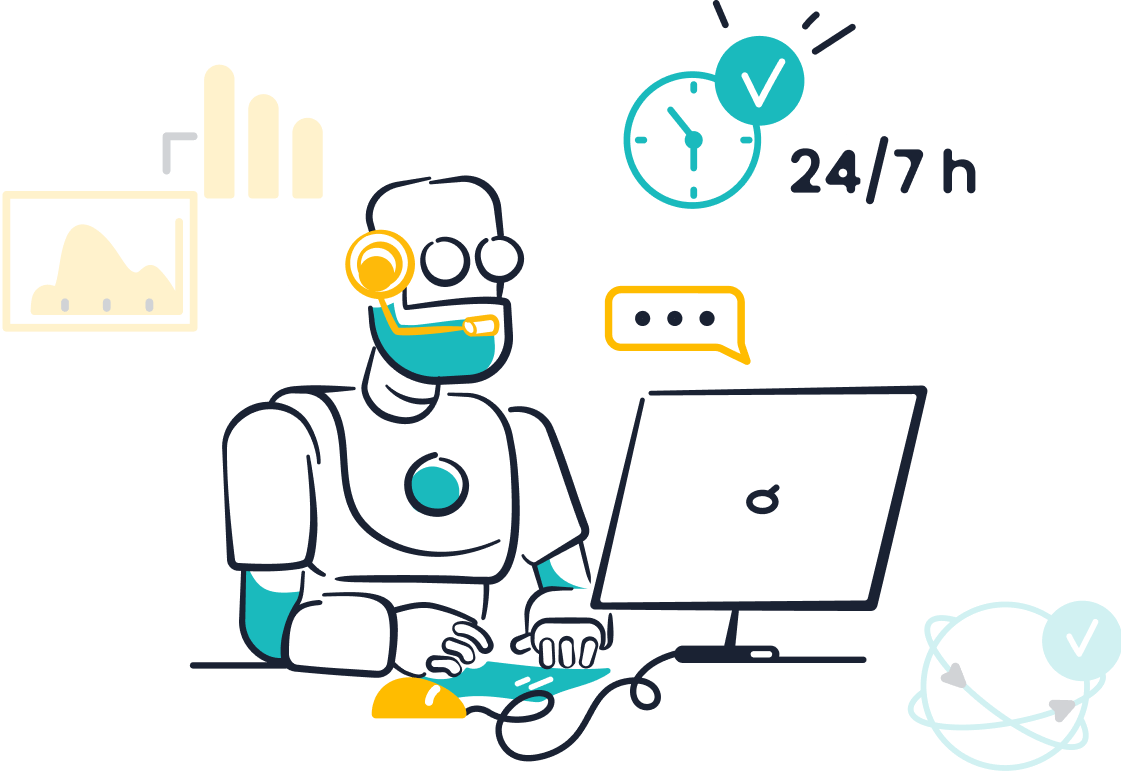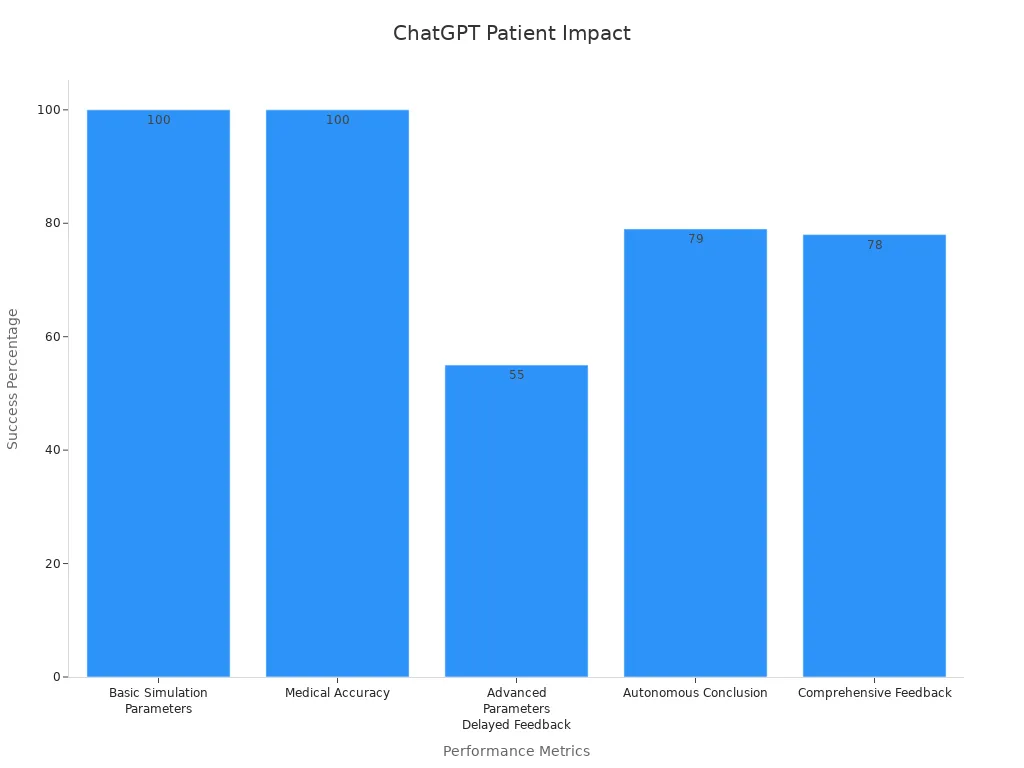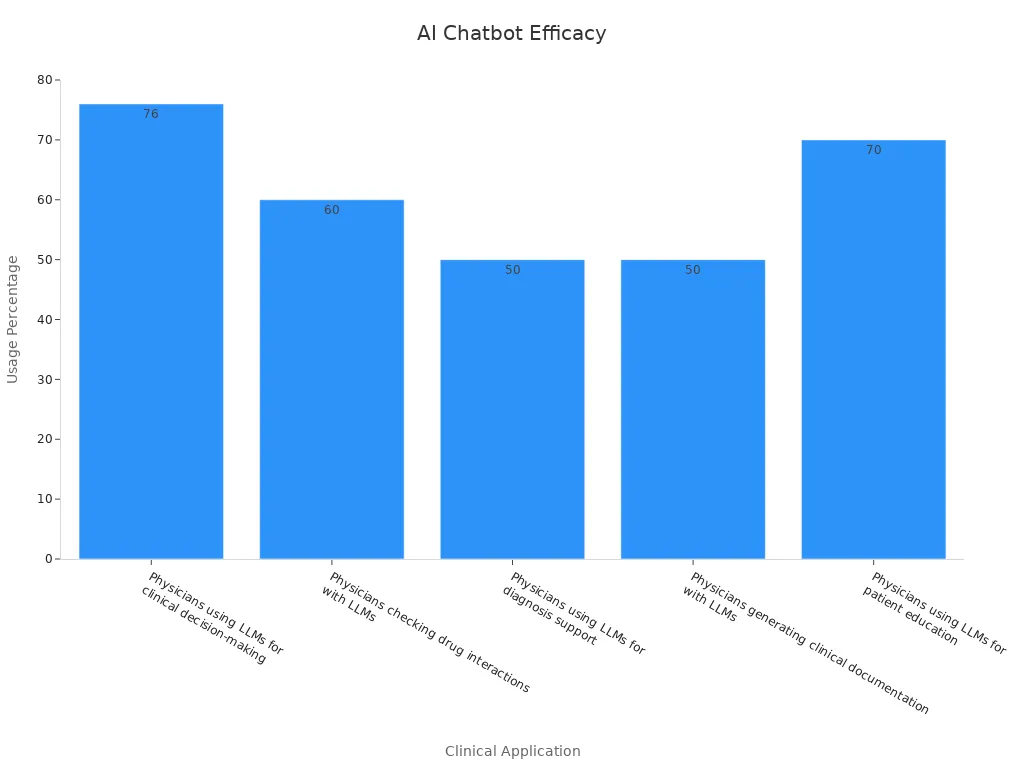Best Chatbot Solutions for Healthcare Organizations

Chatbots have revolutionized healthcare by enhancing patient engagement and streamlining operations. You can see their impact in real-world scenarios. For instance: Babylon Health reduced emergency room visits by 25%. My Chart automated 200,000 monthly appointments, cutting wait times by 40%. Platforms like Florence AI even improved medication adherence rates by 30%. Leading solutions, including Sobot, ChatGPT, Microsoft Copilot, Rasa, and Kore.ai, offer advanced features to meet diverse needs. Choosing the right chatbot solution for healthcare organizations ensures better outcomes for both patients and providers.
Overview of Healthcare Chatbots

What Are Healthcare Chatbots?
Healthcare chatbots are intelligent virtual assistants designed to interact with patients and healthcare providers. They use artificial intelligence (AI) to simulate human-like conversations. These tools help you access medical information, schedule appointments, and manage health-related tasks. Chatbots in healthcare are available 24/7, ensuring you receive support whenever needed. They can also integrate with electronic health records (EHRs) to provide personalized assistance.
Benefits of Chatbots in Healthcare
Chatbots offer numerous benefits to healthcare organizations and patients. They improve efficiency by automating repetitive tasks, such as answering common questions or scheduling appointments. This allows healthcare providers to focus on more critical responsibilities. Chatbots also enhance patient engagement by providing instant responses and personalized care. For patients, they reduce wait times and make healthcare services more accessible. Additionally, chatbots can lower operational costs for healthcare organizations by minimizing the need for additional staff.
Common Use Cases in Healthcare
Patient Support and Engagement
Chatbots play a vital role in improving patient support. They provide instant answers to frequently asked questions, such as medication instructions or post-treatment care. You can also use them to access educational content about health conditions. This empowers you to make informed decisions about your well-being.
Appointment Scheduling and Reminders
Scheduling appointments becomes seamless with chatbots. They allow you to book, reschedule, or cancel appointments at your convenience. Chatbots also send reminders to ensure you don’t miss important consultations. This reduces no-show rates and improves overall efficiency.
Symptom Checking and Triage
Chatbots assist in pre-screening patients by collecting symptoms and medical history. They analyze this information to guide you on the next steps, such as consulting a specialist. This helps healthcare providers prioritize cases and deliver timely care.
| Use Case | Description |
|---|---|
| Appointment Scheduling | Chatbots streamline the appointment scheduling process, allowing patients to book, reschedule, or cancel appointments conveniently. |
| Educational Content | Chatbots provide valuable information about health conditions, empowering patients to make informed decisions about their well-being. |
| Medication Reminders | They assist in managing chronic conditions by sending medication reminders to patients. |
| Symptom Checking | Chatbots can pre-screen patients by collecting symptoms and history before scheduling consultations with specialists. |
Comparison of Top Healthcare Chatbot Solutions

Sobot Chatbot
Sobot Chatbot stands out as one of the top AI chatbots for healthcare organizations. Its AI-powered capabilities enable seamless automation of patient interactions, improving efficiency by up to 70%. You can rely on its 24/7 availability to handle routine queries, triage symptoms, and assist with appointment scheduling. The chatbot supports multiple languages, ensuring accessibility for diverse patient populations.
Sobot Chatbot integrates with omnichannel platforms like WhatsApp and SMS, allowing patients to connect through their preferred communication channels. Its no-code setup makes it easy for healthcare providers to deploy and customize workflows. For example, Agilent, a leader in life sciences, achieved a sixfold increase in customer service efficiency and a 25% cost reduction by implementing Sobot's chatbot solution. This demonstrates its ability to enhance operational efficiency while maintaining high patient satisfaction.
| Metric Category | Description | Confounding Variables |
|---|---|---|
| Accuracy | Provides precise responses based on healthcare-specific queries. | Domain type, Task type |
| Trustworthiness | Ensures reliable interactions for patients and providers. | User type |
| Empathy | Delivers patient-centric responses with a focus on understanding needs. | User type |
| Performance | Excels across various healthcare tasks, including triage and scheduling. | User type, Domain type, Task type |
Explore more about Sobot Chatbot’s features here.
ChatGPT
ChatGPT has emerged as one of the most used AI chatbots in healthcare due to its advanced natural language processing capabilities. It excels in patient engagement by providing accurate and comprehensive responses. You can use ChatGPT to simulate human-like conversations, making it ideal for symptom checking, triage, and answering health-related queries.
Performance metrics highlight its effectiveness. ChatGPT achieved 100% accuracy in basic simulation parameters and medical responses, ensuring reliable patient interactions. However, advanced parameters like delayed feedback showed a 55% success rate, indicating room for improvement in real-time responsiveness. Its ability to autonomously conclude 79% of interactions demonstrates its potential to reduce the workload on healthcare staff.

| Metric | Result |
|---|---|
| Basic Simulation Parameters | 100% (n=360) met |
| Medical Accuracy | 100% (n=360) accurate |
| Advanced Parameters (Delayed Feedback) | 55% (200/360) delayed feedback |
| Autonomous Conclusion | 79% (285/360) concluded autonomously |
| Comprehensive Feedback | 78% (282/360) provided comprehensive feedback |
Learn more about ChatGPT’s applications in healthcare here.
Microsoft Copilot
Microsoft Copilot integrates AI-driven tools to enhance efficiency in healthcare organizations. It focuses on reducing administrative burdens, allowing clinicians to dedicate more time to patient care. You can benefit from its integration with Wolters Kluwer's UpToDate, which provides evidence-based medical content tailored to patient needs.
This chatbot solution streamlines workflows by automating repetitive tasks, such as documentation and scheduling. Its integration capabilities ensure seamless connectivity with existing systems, making it a valuable tool for healthcare providers. For example, Copilot’s ability to deliver patient-specific insights improves decision-making and enhances care quality.
| Integration | Description |
|---|---|
| Wolters Kluwer's UpToDate | Integrated into Microsoft Copilot Studio to provide patient-specific, evidence-based medical content. |
| Purpose | Aims to improve efficiency by reducing administrative burdens on clinicians, allowing more focus on patient care. |
Discover more about Microsoft Copilot’s healthcare solutions here.
Rasa
Rasa is an open-source framework that empowers you to build custom AI chatbots tailored to your healthcare needs. It provides a flexible platform where you can design conversational agents that align with your organization's specific requirements. Unlike pre-built chatbot solutions, Rasa allows you to create workflows and integrate them seamlessly with your existing systems.
One of Rasa's standout features is its ability to handle complex conversations. You can use its natural language understanding (NLU) capabilities to interpret patient queries accurately. This ensures that your chatbot delivers precise and context-aware responses. For example, Rasa can guide patients through symptom-checking processes or provide detailed information about treatment options.
Rasa also supports multilingual capabilities, making it ideal for healthcare organizations that serve diverse populations. You can train your chatbot to communicate in multiple languages, ensuring accessibility for all patients. Additionally, Rasa's open-source nature gives you complete control over data security and compliance, which is crucial in the healthcare industry.
If you're looking for a solution that offers customization and scalability, Rasa is an excellent choice. It enables you to build AI chatbots that not only meet your current needs but also adapt to future challenges.
Kore.ai
Kore.ai is a leading provider of conversational AI solutions designed to enhance patient care and operational efficiency. Its healthcare-focused chatbots offer a wide range of functionalities, from appointment scheduling to symptom triage. You can rely on Kore.ai to automate routine tasks, freeing up your staff to focus on more critical responsibilities.
One of Kore.ai's key strengths is its integration capabilities. It connects seamlessly with electronic health records (EHRs), customer relationship management (CRM) systems, and other healthcare platforms. This ensures that your chatbot has access to the data it needs to provide personalized and accurate responses.
Kore.ai also excels in delivering omnichannel support. Patients can interact with your chatbot through various channels, including websites, mobile apps, and social media platforms. This makes it easier for them to access healthcare services whenever and wherever they need them.
Another notable feature is Kore.ai's focus on compliance. Its chatbots are designed to adhere to healthcare regulations like HIPAA, ensuring that patient data remains secure. This makes Kore.ai a reliable solution for organizations that prioritize data privacy and security.
By choosing Kore.ai, you can implement AI chatbots that improve patient engagement, reduce operational costs, and enhance the overall quality of care.
Other Notable Solutions (e.g., Ada Health, BotPenguin, Babylon Health)
Several other AI chatbot solutions have made significant contributions to the healthcare industry. These platforms offer unique features that cater to specific needs, making them valuable options for healthcare organizations.
-
Ada Health: Ada Health specializes in symptom assessment and triage. You can use its chatbot to guide patients through a series of questions, helping them understand their symptoms and decide on the next steps. Its AI-driven approach ensures accurate and reliable assessments.
-
BotPenguin: BotPenguin focuses on affordability and ease of use. It offers a no-code platform where you can create chatbots for tasks like appointment scheduling and patient support. This makes it an excellent choice for smaller healthcare providers looking for cost-effective solutions.
-
Babylon Health: Babylon Health combines AI with telemedicine to deliver comprehensive healthcare services. Its chatbot can assess symptoms, provide medical advice, and even connect patients with doctors for virtual consultations. This makes it a versatile solution for organizations aiming to offer end-to-end care.
Each of these solutions brings something unique to the table. Whether you need advanced symptom-checking capabilities, cost-effective tools, or integrated telemedicine services, these platforms can help you achieve your goals.
Key Considerations for Choosing a Chatbot Solution for Healthcare Organizations
Compliance with Healthcare Regulations (e.g., HIPAA)
When selecting a chatbot solution for healthcare organizations, compliance with healthcare regulations like HIPAA is critical. These regulations ensure the protection of sensitive patient data, also known as Protected Health Information (PHI). A chatbot operating in the healthcare sector must adhere to strict guidelines for data handling, storage, and sharing. For example, HIPAA mandates that chatbots operate in secure environments and implement encryption to safeguard PHI.
Non-compliance can result in severe penalties, which makes regulatory adherence a top priority. A survey revealed that only 29% of healthcare organizations are fully HIPAA-compliant. This highlights the need for chatbot companies to prioritize compliance measures. Additionally, HIPAA grants patients control over their PHI, fostering trust and improving communication between patients and providers.
To ensure compliance, you should look for chatbot companies that offer features like secure data storage, encryption, and regular self-audits. OpenAI, for instance, supports HIPAA compliance by signing Business Associate Agreements (BAA). Implementing a comprehensive compliance strategy, including collaboration between developers and healthcare providers, is essential for success.
Tip: Always verify that the chatbot solution you choose complies with local and international healthcare regulations to avoid legal risks and build patient trust.
Integration with Existing Systems (e.g., EHRs, CRMs)
Effective integration with existing systems like Electronic Health Records (EHRs) and Customer Relationship Management (CRM) platforms is another crucial factor. A well-integrated chatbot can access patient data, analyze it, and provide personalized responses. This enhances patient satisfaction and adherence to care plans. For example, AI chatbots integrated with EHRs can tailor interactions based on a patient’s medical history, improving outcomes.
Integration capabilities also streamline workflows. Chatbots can pull up past conversations and relevant data from CRM systems, enabling personalized communication. They can also automate tasks like appointment scheduling and billing, reducing administrative burdens. For instance, Sensely, an AI assistant, reduced hospital readmission rates by 75% through effective integration with EHRs.
| Aspect | Evidence |
|---|---|
| CRM Compatibility | Chatbots can pull up past conversations and relevant data, enabling personalized responses. |
| Patient Engagement | Implementing AI assistants like Sensely has reduced readmission rates by up to 75%. |
| Call Routing | AI-driven routing has improved response times by 79%, enhancing patient satisfaction. |
Training staff on how to use chatbot insights can further improve engagement and service strategies. Immediate responses provided by chatbots also reduce wait times, increasing patient satisfaction. When evaluating chatbot companies, ensure their solutions offer robust integration capabilities to maximize efficiency.
Scalability and Customization
Scalability and customization are vital for the long-term success of a chatbot solution in healthcare. As your organization grows, the chatbot must adapt to handle increased patient interactions and new functionalities. Growth and scalability depend on the chatbot’s ability to integrate with core systems like EHR platforms and billing tools. Continuous monitoring and updates also ensure the chatbot remains effective in real-time healthcare settings.
Customization allows you to tailor the chatbot to meet your organization’s specific needs. For instance, you can design workflows that align with your operational goals or add multilingual capabilities to serve diverse patient populations. Extensive testing of conversation workflows and response scripts ensures accuracy and usability, which are essential for maintaining high-quality interactions.
| Evidence Type | Description |
|---|---|
| Integration with Core Systems | Chatbots can connect to EHR platforms, appointment scheduling systems, and billing tools to enhance functionality. |
| Extensive Testing | Rigorous testing of conversation workflows and response scripts ensures accuracy and usability. |
| Continuous Monitoring | Ongoing updates and performance tracking improve chatbot effectiveness in real-time healthcare settings. |
When choosing a chatbot solution for healthcare organizations, prioritize scalability and customization. These features ensure the chatbot can grow with your organization and adapt to changing needs, providing a sustainable solution for patient engagement and operational efficiency.
Cost-Effectiveness and ROI
Investing in ai-powered chatbots can significantly improve the financial efficiency of healthcare organizations. These tools reduce labor costs by automating repetitive tasks, such as answering common patient queries or scheduling appointments. This allows your staff to focus on more complex responsibilities, minimizing the need for additional hires. Additionally, chatbots lower overhead costs by reducing the reliance on physical infrastructure and equipment.
The return on investment (ROI) for chatbots is faster compared to traditional customer support methods. For instance:
- A report by Juniper Research highlights potential savings of up to $3.6 billion globally by 2022 for healthcare organizations.
- An Accenture study estimates that AI chatbots could generate annual savings of up to $150 billion in the U.S. healthcare sector.
Chatbots also enhance revenue by improving patient retention and satisfaction. Features like online appointment scheduling and bill payment simplify processes for patients, leading to higher conversion rates and increased revenue. For example, enabling patients to complete forms or schedule appointments online reduces administrative delays and improves their overall experience. This not only saves time but also builds trust, encouraging patients to return for future care.
By implementing customer support automation, you can achieve long-term cost savings while delivering high-quality care. The financial benefits, combined with improved operational efficiency, make chatbots a valuable investment for healthcare organizations.
Multilingual and Omnichannel Capabilities
Healthcare organizations serve diverse populations, making multilingual and omnichannel capabilities essential for effective communication. Chatbots equipped with these features can hold one-to-one conversations with patients in their preferred language, ensuring accessibility for everyone. This fosters personalized experiences and improves patient satisfaction.
The chatbot market has seen significant growth due to these capabilities. In 2018, the market size was valued at $116.9 million, and it is projected to reach $345.3 million by 2026, with a compound annual growth rate (CAGR) of 14.5%. This growth reflects the increasing demand for chatbots that can handle multiple languages and operate across various platforms.
Omnichannel support allows patients to interact with chatbots through their preferred communication channels, such as websites, mobile apps, or social media. This 24/7 availability ensures real-time assistance, reducing hospital congestion and improving the overall patient experience. Chatbots can also manage multiple patients simultaneously, streamlining operations and enhancing efficiency.
These capabilities extend beyond basic interactions. Chatbots can assist with tasks like symptom checking, medication management, and post-treatment care. They also integrate with organizational systems to update documentation and provide seamless support. By adopting multilingual and omnichannel chatbots, you can meet the needs of a diverse patient base while optimizing your healthcare services.
Future Trends in Healthcare Chatbot Technology

AI-Driven Diagnostics and Decision Support
The future of healthcare chatbots lies in their ability to assist with diagnostics and decision-making. These tools are evolving into Virtual Health Assistants, capable of analyzing patient data and providing preliminary medical advice. You can rely on these assistants to automate tasks like scheduling appointments, delivering test results, and offering personalized health recommendations. This not only improves patient engagement but also reduces the workload on healthcare providers.
AI-powered chatbots are already making a significant impact. For example, 76% of physicians use large language models (LLMs) for clinical decision-making, while 60% check drug interactions with these tools. Additionally, 70% of physicians utilize LLMs for patient education, highlighting their growing role in healthcare.

These advancements demonstrate how conversational ai is transforming healthcare by enhancing diagnostic accuracy and decision support. As predictive analytics and LLM-orchestration solutions continue to develop, you can expect even greater efficiency and personalization in healthcare services.
Emotional Intelligence and Empathy in Chatbots
Chatbots are becoming more human-like by incorporating emotional intelligence and empathy. These features allow them to understand and respond to patients' emotions, creating a more supportive experience. For instance, a chatbot can detect stress or anxiety in your messages and adjust its tone to provide comfort. This makes interactions feel more personal and less robotic.
Emotional intelligence in conversational ai also helps build trust between patients and healthcare providers. By addressing emotional needs, chatbots can improve patient satisfaction and adherence to treatment plans. As this technology advances, you will see chatbots playing a larger role in mental health support, offering empathetic responses and guiding patients to appropriate resources.
Real-Time Health Monitoring and Alerts
Real-time health monitoring is another exciting trend in chatbot technology. Chatbots equipped with AI can analyze data from wearable devices, such as heart rate monitors or glucose sensors. They can then provide instant feedback or alerts based on this data. For example, if your heart rate spikes unexpectedly, the chatbot can notify you and suggest immediate actions.
This capability enhances patient safety by enabling early intervention. Virtual Health Assistants can also send reminders for medication or follow-up appointments, ensuring you stay on track with your healthcare plan. With 24/7 accessibility, these chatbots make healthcare more proactive and personalized.
As conversational ai continues to evolve, real-time monitoring will become a standard feature, empowering you to take control of your health. These advancements highlight the potential of AI to revolutionize patient care and improve outcomes.
Multimodal Interaction Capabilities (e.g., voice, text, video)
Multimodal interaction capabilities allow you to communicate with healthcare chatbots using voice, text, or video. These features make chatbots more accessible and user-friendly. For example, you can use voice commands to describe symptoms, type questions for quick answers, or even share medical images during a video consultation. This flexibility ensures that you can interact with the chatbot in a way that feels most comfortable.
Multimodal AI enhances understanding by combining different types of data, such as text, images, and speech. This integration leads to more accurate diagnoses. For instance, a chatbot can analyze your medical scans alongside your health history to reduce the risk of misdiagnosis. It also democratizes knowledge by catering to various learning styles. Whether you prefer reading, listening, or watching, the chatbot adapts to your needs, making healthcare information more engaging and inclusive.
These capabilities also improve accessibility for people with disabilities. Voice commands help those who cannot type, while video interactions assist patients who need visual explanations. By offering multiple ways to communicate, multimodal chatbots ensure that healthcare services are available to everyone.
Increased Personalization Through Advanced AI
Advanced AI enables chatbots to provide highly personalized healthcare experiences. These chatbots analyze your data to offer customized responses that address your specific needs. For example, they can send medication reminders tailored to your schedule or provide follow-up care instructions based on your treatment plan. This level of personalization fosters better patient engagement and adherence to medical advice.
AI-powered chatbots use natural language processing and machine learning to understand your preferences and medical history. They can guide you through complex healthcare processes, such as scheduling appointments or managing chronic conditions. For instance, Chat Data’s chatbot tailors its responses to your individual needs while maintaining your privacy. It also automates routine tasks, reducing costs for healthcare providers.
Personalized chatbots improve the overall quality of care. They ensure that you receive accurate advice and timely reminders, helping you stay on track with your health goals. By leveraging advanced AI, these chatbots transform healthcare into a more patient-centric experience.
Choosing the right chatbot solution can transform your healthcare organization. The blog highlighted top solutions like Sobot, ChatGPT, and Kore.ai, each offering unique features to enhance patient care and operational efficiency.
Tip: Focus on solutions that align with your goals, such as compliance, scalability, or multilingual support.
Evaluate your organization's needs carefully. Explore the solutions mentioned to find the one that best fits your requirements. The right choice will improve patient satisfaction and streamline your operations.
FAQ
What is the primary purpose of healthcare chatbots?
Healthcare chatbots aim to improve patient engagement and streamline operations. They assist with tasks like scheduling appointments, answering health-related questions, and providing symptom checks. These tools enhance efficiency and ensure patients receive timely support.
Are healthcare chatbots secure for managing patient data?
Yes, most healthcare chatbots comply with regulations like HIPAA. They use encryption and secure environments to protect sensitive patient information. Always verify that the chatbot solution you choose adheres to data privacy standards.
Can chatbots replace human healthcare providers?
No, chatbots cannot replace healthcare providers. They complement medical professionals by handling routine tasks and providing preliminary assistance. This allows doctors and nurses to focus on complex cases and deliver better care.
How do chatbots handle multilingual communication?
Chatbots use advanced AI to support multiple languages. They detect the user’s preferred language and respond accordingly. This feature ensures accessibility for diverse patient populations and improves communication.
What industries benefit from healthcare chatbots?
Healthcare chatbots serve hospitals, clinics, and telemedicine platforms. They also assist pharmaceutical companies, wellness programs, and insurance providers. Their versatility makes them valuable across various healthcare-related industries.
Tip: Always choose a chatbot solution that aligns with your organization’s specific needs and goals for maximum impact.
See Also
Best 10 Chatbot Solutions for Websites This Year
Essential Tips for Selecting Top Chatbot Software
Comparative Review of Leading Live Chat Solutions 2024